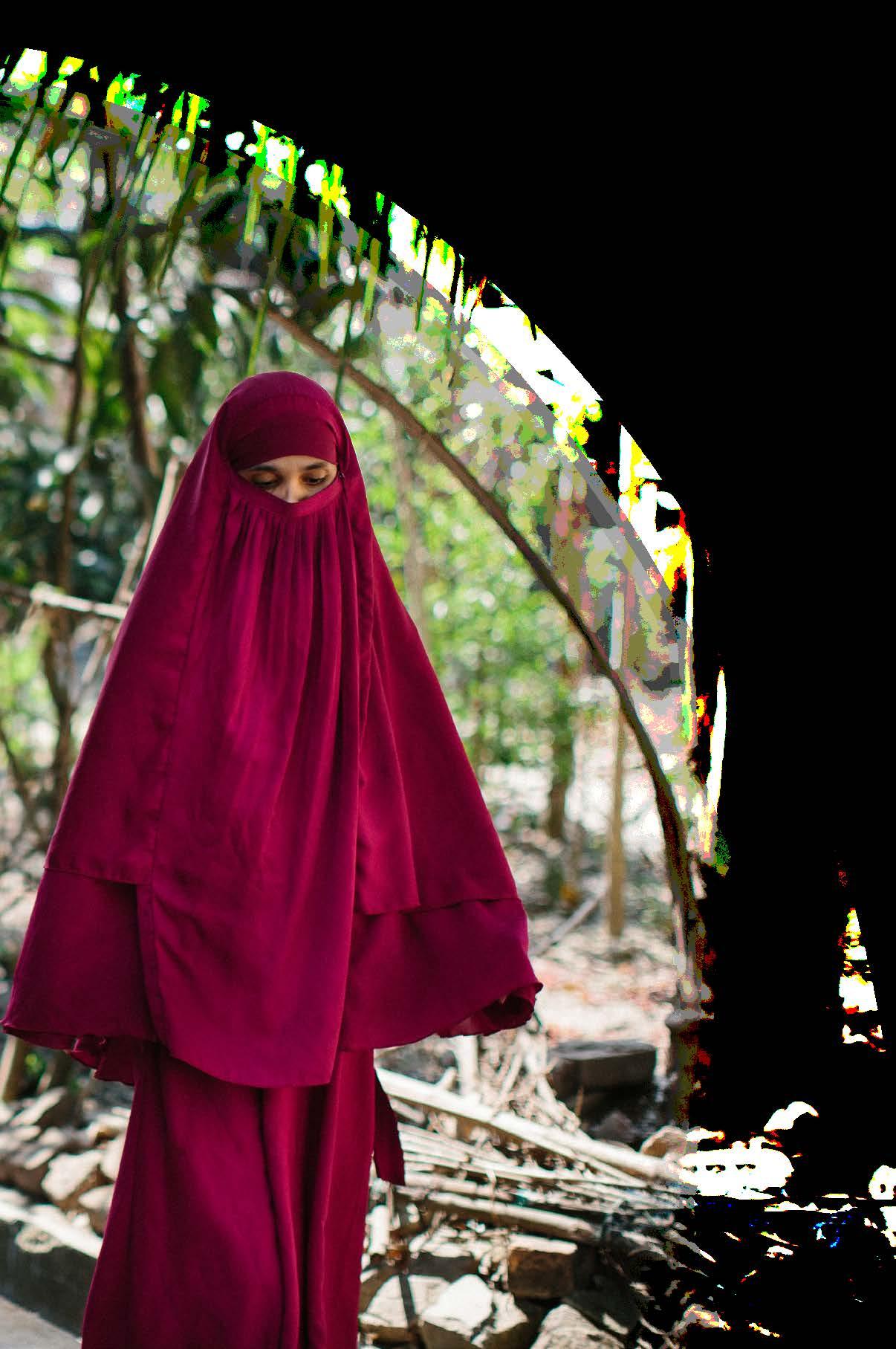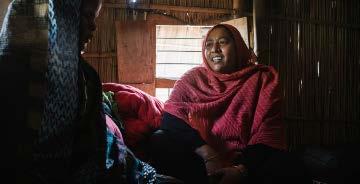

Mind to Heart




minds are free, and all their anxieties are lifted, even if only for a short time, the effect is profound.
When people ask me what keeps me motivated with my work at Lepra, without any hesitation I say it is the people we serve, people like Munnilal and many others whose lives have been impacted so positively as a result of our intervention. I feel blessed to have the opportunity to play even a small role in the journey of this project.
I am pleased to announce that Samarth and our Mind to Heart project in Bangladesh have recently been successful in finding additional funding, to enable the projects to grow and flourish.
In this issue of Lepra News, we will take a closer look at how the innovative Mind to Heart project is working with the ‘Bogura Federation of People Affected’, to provide greater access to emotional support for people with grade 2 disabilities. We will also meet Bilkis, and hear about her inspirational recovery with the help of the Bogura Federation.
Thank you so much for following Lepra’s work through our centenary. Your support helps us to raise awareness of these neglected diseases and reduce the impact they have on some of the most vulnerable communities.

(With lots of love and gratitude)
Yours,
Mowmita

A New Look
We hope you love the new-look Lepra News, and we are confident that you will be delighted to hear that sustainability was a key focus in its design!
In line with our new communications strategy, we are moving to a new size and format, with new printing processes which allow us to make significant improvements. This will not only benefit the environment, but will also reduce our overhead costs, helping us become even more costeffective.
The new-look Lepra News is printed on responsibly sourced paper, with a clear compostable wrapper which can be disposed of with your food recycling! So no more unnecessary plastic!
It’s nice to know that the carbonbalanced paper offsets production emissions through the World Land Trust, helping to protect land from deforestation and tackling greenhouse gas emissions.
Lepra News now only uses materials from FSC-certified forests, recycled sources, and FSC-controlled wood, reducing sourcing risks from unacceptable origins.

Stay tuned for more updates and improvements!
www.lepra.org.uk
Mind to Heart
Following the COVID-19 pandemic, concern was raised over increases in demand for mental health services, exposing chronic inadequacies in global provision.
AWHO brief in 2022 estimated a 25 to 27 percent increase in the prevalence of depression and anxiety as a result of the pandemic.
With the additional impact of ongoing political and economic uncertainties, and society feeling more polarised than ever, it is apparent that even wellresourced national healthcare systems are struggling to meet the emotional health needs of their country’s population. This has led to a call from the WHO to make mental health and wellbeing a global priority.
Healthcare inequality, access to information and education and socioeconomic disparities, inevitably mean that it is the world’s most vulnerable communities who will face the greatest impact of poor mental health. People affected by neglected tropical diseases, such as leprosy, face perhaps some of the greatest challenges in maintaining their mental health, which is widely understood to have a direct effect on people’s physical recovery. According to a mental health and NTD study published in Leprosy Review, one in two people diagnosed with leprosy experiences depression and/or anxiety.
Community-Led
Recognising the important role of positive mental health for people affected by leprosy,
over the last decade, Lepra have developed a series of projects, which seek to integrate emotional health strengthening components, into leprosy and lymphatic filariasis (LF) treatment and management programme design. One such example is the Mind to Heart project in Bangladesh, which is now moving into its second phase.
Building on learning gained from projects such as Lepra’s ‘Mental Motivators’, the Mind to Heart project is a community-led project, funded by the Sasakawa Health Foundation, and working in partnership with the





Bogura Federation – a grassroots Community-Based Organisation (CBO) supported by Lepra, which brings together a network of 101 community ‘self-support groups’ throughout Bangladesh’s Bogura District.
Running throughout 2023, the first phase of the project aimed to support 300 people affected by leprosy with grade 2 disability in the Bogura District. Mind to Heart’s initial aims included improving levels of emotional wellbeing alongside raising awareness. Improving access to community and specialist mental health services were key along with widening the capabilities of the Federation to serve as a centre of holistic care.
To help improve emotional healthcare access, alongside the project’s physical and socioeconomic care aims, three tiers of intervention were made available: With community volunteer ‘Mental Motivators’ trained to provide lower-level support, awareness-raising and signposting, professional structured counselling for people with moderate need, and specialist onward referrals made for the
highest level of mental health needs.
Phase 1 activities, including mental health counselling, were well received by participants. With 91% of survey participants stating that Mental Motivator support has been beneficial for their wellbeing and 74% stating that they had better knowledge about emotional health issues.
Therapeutic Interventions
The second phase of the project, which began in the Spring of 2024, seeks to implement improvements from lessons learnt during the first phase of the project. In particular, the need for more intensive and longerterm therapeutic interventions for supporting people with moderate mental health needs, and greater capacity for the team of Mental Motivators to provide lower-level emotional health support, information, and a point-of-contact for the community.
As Mind to Heart continues, the solid foundations provided by phase one, will allow the project to further strengthen the ability of the Federation to provide even more effective holistic support for the communities they represent.
The Mind to Heart project demonstrates that there is no single intervention which can solve the issue of poor mental health. It is clear that a range of interventions are needed, and the interdependency of emotional, social, financial, and physical health for people affected by leprosy is clearer than ever. Mind to Heart will continue to be embedded into local healthcare structures, with the Federation leading sustainable improvements for years to come.



Bilkis Begum is 48 years old and lives in the Bogura district of Bangladesh.
She has three daughters and a son, but sadly her husband passed away shortly after the birth of her youngest daughter.
During a routine check-up when her daughter was one year old, her doctor noticed that she had patches of white skin which had very little sensation. She soon received a diagnosis of leprosy and was sent for multidrug therapy (MDT) treatment at the regional clinic.
With no husband, no support from her wider family or community, and trying to feed four young children, Bilkis had no choice but to beg for
food and money, forcing her to delay her treatment until her children were older.
The delay in treatment, meant Bilkis’ condition seriously deteriorated. Her legs had become weak, and she had lost significant sensation as a result of nerve damage. Unable to walk or maintain employment, she used a wheelchair to beg, which took a significant toll on her emotional wellbeing. Her children were taken into an orphanage, and she was isolated in her community.
Bilkis was identified by the ‘Bogura Federation of People Affected’ as someone with significant vulnerabilities, and arranged for her to join Lepra’s Mind to Heart project.



The Federation is a grassroots organisation supported by Lepra, who provide a sense of community, social and economic support for people affected by leprosy and LF. Mind to Heart supports people with a range of emotional health needs.
Supported by a ‘Mental Motivator’, Bilkis accessed structured counselling sessions, to help her rebuild her confidence and sense of dignity. Lepra’s community health workers and leaders of the Bogura Federation attended advocacy meetings with government health and social welfare officials, helping her to receive vital economic support, and suitable housing.
Bilkis now has the ongoing support she needs to thrive and maintain her emotional health. Her outlook on life has completely changed, she feels empowered and no longer bound by prejudice and discrimination.
She has become a champion in her community, a symbol of resilience, strength, and emotional recovery. Bilkis now plans, with the help of the Federation, to open her own small shop, selling groceries to provide a sustainable income for the future.
Scan the QR code below to read more about Lepra’s work, and the people we support.


by Tom Bradley



Heart and sole
Protective footwear can be vital for children and adults with leprosy and lymphatic filariasis. A new project in India, is aiming to scale up the production of footwear, with a innovative and self-sustaining model.
Lepra has led the way in providing customised footwear for people with leprosy and LF since 1993. Correct footwear is vital for people affected by these conditions.

One of the most serious complications of leprosy is the formation of ulcers compounded by a lack of sensation in the feet. Left untreated and without appropriate footwear these ulcers can lead to long-term damage sometimes requiring amputation.
Lymphatic filariasis is ranked as the second leading cause of disability worldwide. It often results in severe swelling in the feet and legs, making it difficult to wear standard shoes available in the market.
Until now our shoes have been entirely produced by hand, which is a very slow process. To allow us to speed up production and provide footwear to many more people, we have recently opened a footwear production unit in Bihar.
The new Comprehensive Disability Care Unit in Bihar currently produce
50,000 pairs of custom fit shoes per year, and is also able to create a wider range of shoe styles, allowing us to provide footwear which is both functional and stylish, something which people affected have asked us to develop.
We will be expanding the unit over the coming months to enable it to produce 100,000 pairs of shoes per year. We have already received substantial orders to provide specialist footwear to state governments, ILEP agencies, community based organisations and hospitals.
These orders will enable us to cover the costs of producing shoes for our own beneficiaries, and the unit aims to be entirely self-funding within two years.

We would like to express a very special thank you to Charles Bland and The Belpech Trust, Colin Temple, Haddenham Healthcare, and Pavers for their generous support in enabling this project to become a reality.


Free will writing
If you haven’t yet made a will, or would like to update your existing one, Lepra offers a free will-writing service through the National Free Wills Network to anyone aged over 18, living in the UK.
Gifts in wills are the heart of our support; in fact, every third person we help is the result of such a gift.
Making a will is the best way to ensure that your money, property, and other


 Photography by Tom Bradley
SCAN ME
Photography by Tom Bradley
SCAN ME
Patronage News
We are honoured to announce that His Majesty The King has chosen to continue Lepra’s patronage, in the footsteps of his mother, Her Late Majesty Queen Elizabeth II.
Lepra’s relationship with the Royal Family began in 1924, when the Prince of Wales, the future King Edward VIII, became patron of the British Empire Leprosy Relief Association (BELRA), now known as Lepra. He was succeeded by his brother, His Majesty King George VI and his daughter Her Majesty Queen Elizabeth II who became Lepra’s patron in 1952.
Her Late Majesty had a empathy for our cause, born in her engagement with children affected by leprosy in Nigeria who she met when she visited the country in her youth. Throughout her patronage, she demonstrated incredible compassion for our cause and organisation.
Her Late Majesty kept neglected tropical diseases in the public consciousness, and helped challenge perceptions about diseases like leprosy and lymphatic filariasis (LF).
A statement from Buckingham Palace confirmed that 376 of Her Late Majesty’s charity patronages were to be retained by the Royal Family, adding that:

“Royal patronage highlights the vital work of these organisations and allows their many achievements and valuable contributions to society to be more widely recognised and promoted.”
On 7 May 2024, we received a letter from The Palace, informing us that King Charles III was to continue our Royal patronage. To receive such news, particularly in our centenary year is not only an incredible honour for the organisation, but also a direct and potent message of hope and solidarity for the people we support.

“His Majesty’s patronage will be a source of great motivation across the world of Lepra, and will inspire us onwards to keep delivering our vital work supporting people affected by leprosy and lymphatic filariasis”
Jimmy Innes, Lepra’s CEOOne hundred years on, we are thankful that the Royal Family continue to shine the brightest of lights on leprosy and LF, and we hope will continue to until we are needed no more.


IWD2024
On 4th March 2024, we held an inspirational International Women’s Day event in partnership with the University of Essex.
On 4 March 2024, we held an inspirational International
access to financial, social

Emeritus Professor Diana Lockwood reflected on how when she first began working in leprosy research, it was a male-dominated field but as time and attitudes have changed, an increasing number of women have made significant contributions.
We enjoyed hearing about Diana’s advisory role for Victoria Hislop’s best-selling novel, The Island, which explores themes of prejudice against people affected by leprosysomething which sadly still prevails today.
Maria and Mowmita, Lepra’s programme managers in Bangladesh and India respectively spoke about the critical role women play in the control of NTD’s. Investing in female health workers has been fundamental in enabling us to approach women in their communities in a way that makes them feel comfortable and to encourage them to discuss their emotional health.
Impactful videos shared showed Maksuda from Bangladesh explaining how her leprosy diagnosis led to discrimination and how lonely and isolated she felt. She now helps other women overcome their feelings of loneliness through support groups, offering friendship when it’s in very short supply from elsewhere.
Manikyamma, in India, explained how her parents both had leprosy and so




when she received her diagnosis, she wasn’t frightened by it. Manikyamma now works for Lepra Society in India at the Blue Peter Public Health and Research Centre in Hyderabad.
The audience found the videos moving and inspirational and we are extremely grateful to Maksuda and Manikyamma for sharing their stories.
The evening was rounded off with a Q&A panel comprising Lepra’s CEO, Jimmy Innes, Lepra Trustee, Sampa Bhasin, Dr Kamrun Koly, a researcher from Bangladesh, Professor Judith Bueno De Mesquito Senior Lecturer, Essex Law School and Co-Deputy Director of the University’s Human Rights Centre.
One of the highlights of the evening was Jimmy sharing a drawing his 9-year-old daughter Amber had drawn to promote International Women’s Day based on a photo of Taslima, a woman with
resilience, featured on a recent front cover of Lepra recalled when she was a young child, her mother volunteer in a leprosy settlement

and that memory inspired to become a Trustee for Lepra.
Both Jimmy and Sampa relayed stories about the women they had met whilst with Lepra, describing their strength, determination and resilience.
Dr Kamrun Koly spoke about how the mental health of people affected by leprosy and LF is impacted and how they are marginalised in their communities.
Professor Bueno De Mesquito explained how Lepra’s work links with Human Rights and Public Health with the key features being participation and accountability.
Overall, the evening helped to highlight the issue that without gender equity, we will not succeed to solve global challenges.
Thank you to all those who contributed to and attended the event. A live recording and images from can be viewed on our website:


 Sampa Bhasin
Maksuda
Sampa Bhasin
Maksuda
A centenary challenge
A special thank you to the 2024 TCS London Marathon runners for their incredible dedication, hard work and kindness for supporting Lepra in our centenary year!



On Sunday 21st April 2024, our team of seven runners took on the challenge of running the iconic TCS London Marathon.
Our runners came from across the UK, and we even had one join us from the Netherlands. The team was a mixture of newbies, who had only recently completed the ‘Couch to 5K’ challenge, through to veteran runners with previous marathon experience.
We were thrilled to have two runners from our corporate supporter Schuh, as well as two family members of the Lepra UK team.
Ahead of the race, Tom Barton, Lepra’s Challenge Ambassador was on hand to offer runners expert advice and encouragement online.
Events Manager Carolyne Morey told us:
“Watching the runners’ journey, from their initial training sessions through to cheering them along on the big day has been truly aweinspiring.”
Each runner completely smashed their fundraising target; with the team raising over £15,000!
It was an incredible day, with us not only cheering on our runners, but just about anyone who had a name on their shirt! It was such a proud moment watching Team Lepra reach the finish line following their incredible journey.
If you are inspired to take on a personal challenge for Lepra, please take a look at upcoming events on our website:
www.lepra.org.uk/events



Are you ready to empower your students’ education?
Scan the QR code to sign up now for free resources and fundraising ideas!


 Photography by Tom Bradley
Photography by Tom Bradley

£25 could fund a Community Champion for an entire month. This Champion can provide crucial support to their local community, and help detect signs and symptoms of disease.

£50 is enough to pay for a counsellor for a week. Our counsellors work closely with an affected person and their spouse, helping them to reduce the impact on their mental health.

£100 will help fund a small business loan to help sow the seeds of opportunity and help people regain their confidence, self-esteem and resilience, and to provide a sustainable income for the long-term.
Five reasons to give regularly
Help people and their families affected by leprosy and LF receive the right care, at the right time and in the right place.
Help keep our administration costs low. 1 2 3 4 5
Help us plan future projects in the areas which need it most.
Spread your giving across the year, and change or stop payments at any time.
Stay informed through regular newsletters and progress updates.







